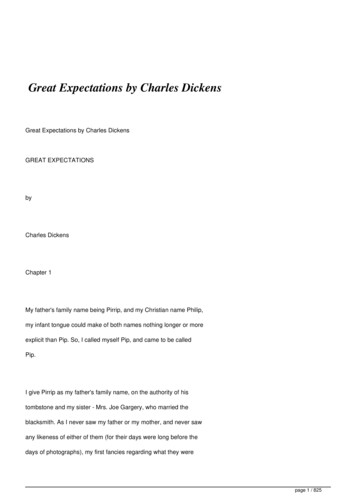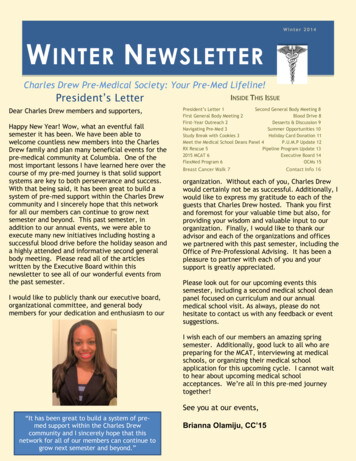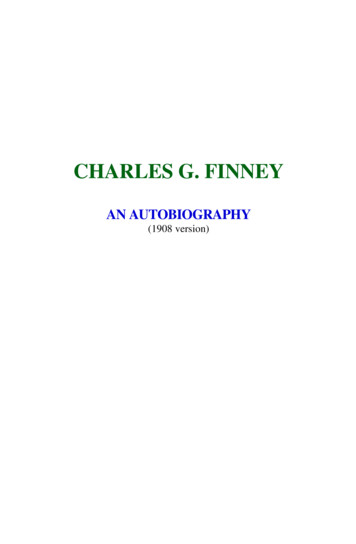
Transcription
CHARLES G. FINNEYAN AUTOBIOGRAPHY(1908 version)
6PREFACE.THE author of the following narrative sufficiently explains its origin andpurpose, in the introductory pages. He left the manuscript at the disposalof his family, having never decided, in his own mind, that it was desirableto publish it. Many of his friends, becoming aware of its existence, haveurged its publication; and his children, yielding to the general demand, havepresented the manuscript to Oberlin College for this purpose.In giving it to the public, it is manifestly necessary to present it essentiallyas we find it. No liberties can be taken with it, to modify views orstatements which may sometimes seem extreme or partial, or even tosubdue a style, which, though rugged at times, is always dramatic andforcible. Few men have better earned the right to utter their own thoughts,in their own words. These thoughts and words are what the many friendsof Mr. Finney will desire. The only changes that seemed allowable, wereoccasional omissions, to avoid unnecessary repetition, or too minute detail,or, at times, references that might seem too distinctly personal. Thenarrative is, in its very nature, personal, involving the experiences both ofthe author and of those with whom he had to do; and to these personalexperiences it, in great part, owes its interest and its value. As the narrativepresents the memories and heart-yearnings of a veteran pastor, with apassion for winning souls, it is hoped and believed that, in its personalreferences, it will not be regarded as having transcended the limits ofChristian propriety. For the most part, the lapse of time sets aside allquestion.Here and there perhaps, the statements in the narrative may seeminadequate, as involving only a partial view of facts. It will be rememberedthat such partial views belong to all personal observation and opinion, andeach one will naturally supply the correction that seems to be demanded.J. H. F.OBERLIN COLLEGE , January, 1876.
7CONTENTSCHAPTER I.BIRTH AND EARLY EDUCATION.Purpose of the Author — Birth and early circumstances — Want ofreligious privileges — Entering upon the study of law — First interest inreligion — Questionings on the subject of prayer.CHAPTER II.CONVERSION T O CHRIST.Decision to attend to religion — Spiritual conflict, and the triumph —Baptism of the Spirit — Sense of justification.CHAPTER III.BEGINNING OF HIS WORK .A retainer from the Lord Jesus Christ — Call to preach — Conversationwith neighbors — Evening meeting — Revival in the village — Visit at hisfather’s — Deacon M— at the monthly concert — Conversion of SquireW. — Morning prayer meeting — Great light — Fasting and prayer —Experience of the burden of prayer.CHAPTER IV.HIS DOCTRINAL EDUCATION AND OTHEREXPERIENCES AT ADAMS .Discussion on the atonement — Revival revived — Further discussion —Encouragement from Elder H. — Lectures on Universalism — Licensed bypresbytery — Father Nash — Review of Mr. Gale’s theology.
8CHAPTER V.PREACHING AS A M ISSIONARY.Labor at Evans’ Mills — The people pledged — Experience of Miss O—— The railer’s death — The false hope — The Universalist subdued —Father Nash’s transformation —Mr. D——’s conversion.CHAPTER VI.REVIVAL AT EVANS ’ M ILLS AND ITS RESULTS .The German church — Meeting for inquirers — Taught to read — Movingscene — Habit of testifying in prayer meeting — Style of preaching —Preaching at presbytery.CHAPTER VII.REMARKS UPON M INISTERIAL EDUCATION.The judge’s view — Criticisms of ministers — The preacher’s aim —Danger in the schools — Advantages of extemporaneous preaching —Manner of preparation — Facsimile of skeleton.CHAPTER VIII.REVIVAL AT ANTWERP.Impression of the place — Prayer on Saturday — Plain preaching onSabbath — Scene at Sodom — Preaching to the Universalists — Sermonon election — Cure of insane woman.CHAPTER IX.RETURN T O EVANS ’ M ILLS.Author’s marriage — Return to his work — Winter at Brownville —Conversion of Mrs. B——. — Attempt to return for his wife — Stoppedat Le Rayville — Premonition of a work at Gouverneur — The vain youngwoman converted.
9CHAPTER X.REVIVAL AT GOUVERNEUR.Ride in the rain — Discussion with Dr.——. — Opposition of young men— Father Nash’s announcement — Conversion of Mr. S——. Oppositionof Baptists — Discussion of Baptism — Aunt Lucy’s relief —Conversion of Mr. M.CHAPTER XI.REVIVAL AT DE KALB .Presbyterians “falling,” — Visit of Mr. F——. — The Catholic tailor —Elder S’s new light — Effect upon the meeting — Going to Synod —Meeting with Mr. Gale — Spirit of prayer.CHAPTER XII.REVIVAL AT WESTERN .The Western revivals — Afternoon prayer meeting — Praying ofMrs. H——. — Conversion of the B—— children — The home of aconvicted daughter — The hay-loft — Adaptation of religious labor —Mr. Gale’s new views and experience.CHAPTER XIII.REVIVAL AT ROME.Remarkable inquiry meeting — Great interest — Little H—— and herfather — Death of a reviler — Conversion of Mr. H——. — Visit ofSheriff B——. — The spirit of prayer — Conversion of theofficer’s wife — Conversion of Mrs. C——.
10CHAPTER XIV.REVIVAL AT UTICA.Abundant prayer — Conversion of Sheriff B—. — The Lowville merchant— Beginning of opposition — Mr. Weeks’ doctrines — Sudden death ofthe minister — Conversion of Miss F T. — Scene in the factory —Conversion of T. D. Weld — False teaching.CHAPTER XV.REVIVAL AT AUBURN IN 1826.Further opposition — Victory in prayer — Dr. S’s new baptism —Conversion of Mr. H——. — Division of the congregation — Dr.Lansing’s painful experience Public confession.CHAPTER XVI.REVIVAL AT T ROY , AND AT NEW LEBANON .Visit to Dr. Nettleton — Influence of the opposition — Dr. Beman beforepresbytery — Conversion of Judge C——’s father — Conversion ofMiss S——. — The work at New Lebanon — Conversion of Dr. W— , ofMr. T, and of John T. Avery — Committee of presbytery — NewLebanon Convention — Notice of Dr. Beecher’s Biography — Remarkson Revivals.CHAPTER XVII.REVIVAL IN STEPHENTOWN.Anxiety of Miss S, — Election evening — Family of Judge P and of Mr.M——. — Death of Mr. B. — Influence of Miss S——.
11CHAPTER XVIII.REVIVALS AT WILLWINGTON AND PHILADELPHIA .Mr. Gilbert — New School preaching and its effect — Beginning inPhiladelphia — Theology at Philadelphia — Hopkinsianism —Conversionof a desperate man — Of a despairing young woman — Fondness fordress — Interest among the lumbermen — Mr. Patterson.CHAPTER XIX.REVIVAL AT READING , PENNSYLVANIA.Unsound teaching — Arrangement for balls — Inquiry meeting — Deathof Dr. Greer — Conviction of Mr. B. — False counsel to inquirers —Conversion of Mr. O’ B——. — His death — Preaching to the editors —Labor at Lancaster — Conversion of Elder K——. — Fatal delay.CHAPTER XX.REVIVAL IN COLUMBIA, AND IN NEW YORK CITY.Account of Mr. H——. — Reorganization of his church — Invitation toNew York — Anson O. Phelps — Diligence of a young woman inrestitution — Conversion of Lewis Tappan — The first FreePresbyterian church.CHAPTER XXI.REVIVAL IN ROCHESTER, 1830.Selection of a field — Adjustment of differences — Conversion of Mrs.M——. — “The Anxious Seat” — Panic in church — Work in the HighSchool — Conversion of the merchant and his wife — Conversion of Mr.P——. the burden of prayer — Effect upon the morals of the city —Effect abroad.
12CHAPTER XXII.REVIVALS IN AUBURN, BUFFALO, PROVIDENCE AND BOSTON .Leaving Rochester — Best at Auburn, and remarkable invitation — AbelClary — Six weeks’ labor — A month in Buffalo — conversion of Mr.H——. — Three weeks in Providence — Conversion of Miss A——. —Invitation to Boston — Sensitiveness of the people — Giving up all to all— Orthodoxy questioned — Proposal from New, York.CHAPTER XXIII.LABORS IN NEW YORK CITY IN 1832, AND ONWARD .Chatham street theatre — Installation — The Cholera — The revival —Diligence of the membership — Conversion of Mr. El. — The freePresbyterian churches — Organization of a Congregational church —Broadway Tabernacle — Voyage to the Mediterranean — A day of prayerat sea — The New York Evangelist — Excitement on slavery — RevivalLectures — Invitation to Oberlin — Decision.CHAPTER XXIV.EARLY LABORS IN OBERLIN.The tent — Financial failure — Hostility of the surrounding region —Embassy to England — Providential supply — Lectures to Christians inNew York — Relations to Western Reserve College — Theologicalprejudice — Popular idea of Oberlin — Spiritual progress at home.CHAPTER XXV.LABORS IN BOSTON AND PROVIDENCE.General excitement upon slavery — Marlborough chapel — A few weeks’preaching in Boston — Call to Providence — Two months, labor there —Interest of Rev. Dr. C——.
13CHAPTER XXVI.T HE REVIVAL IN ROCHESTER IN 1942.Rest in Rochester, and invitation to preach — Lawyers’ request for acourse of Lectures — Judge G——’s conversion — Pastor of St. Luke’s— The quit-claim deed — Doctrines preached — Interest in lawyers —Chronic skepticism — Mr. W. — the priest.CHAPTER XXVII.ANOTHER WINTER IN BOSTON .Second-Adventism — The church in Marlborough Chapel — A falseprophet — A chapter of personal experience — A new consecration —Experiences in connection with the death of Mrs. F——. — Experiencesnot appreciated — Need in Boston.CHAPTER XXVIII.FIRST VISIT T O ENGLAND .Mr. Potto Brown and his religious enterprises — Invitation to England —Labors in Houghton — Invitation to Birmingham — Interview at Mr.James’ — Close Communion — Theology and Dr. Redford — Interestingletter-Preaching at Worcester — Invitation to London — Dr. Campbell andthe Tabernacle.CHAPTER XXIX.LABORS IN T HE T ABERNACLE, M OORFIELDS, LONDON .First inquiry meeting — Large attendance — Visit at the British schoolroom — Definite aim in preaching — The borrowed sermon — Interest inEpiscopal churches — A tea-meeting for poor women — Visit to France— Embarking for home.
14CHAPTER XXX.LABORS IN HARTFORD AND IN SYRACUSE.Brief labor in New York — Invitation to Hartford — Difficulty ofcooperation among the pastors, adjusted — Timidity in regard to measures— Prayer meetings among converts — Organized effort — The churchesin Syracuse — Cooperation of Christians — Interesting communion —Mrs. S’s new baptism — Ladies’ meetings — Taking up the Cross “ —Mother Austin’s faith.CHAPTER XXXI.LABORS IN WESTERN AND IN ROME 1854-5.Case of crime — Confession and restitution — Conversion of the schoolteacher — Preaching at Rome — Distraction in the church.CHAPTER XXXII.REVIVAL IN ROCHESTER IN 1855.Pressing invitation — Preaching to the lawyers — Prevailing interest —The University — Zeal of the ladies — Ingenious spirit — Restrictions inNew England.CHAPTER XXXIII.REVIVALS IN BOSTON IN 1856-57-58.The pastor’s renewal — Divided feeling — Establishment of prayermeetings — The South — Conversion of Mrs. M——.CHAPTER XXXIV.SECOND VISIT T O ENGLAND .Labors at St. Ives — Borough Road chapel — Church distraction andregeneration — Theological apprehensions — Reasoning in the pulpit —Labors at Huntington — Family of Dr. F.
15CHAPTER XXXV.LABORS IN ENGLAND AND SCOTLAND.Preaching in Edinburgh — The E. U. Church — The ladies’ prayer meeting— Preaching in Aberdeen — Circumscribing prejudice — going to Bolton,England — First evening at Bolton — The week of prayer — Cooperationof denominations — Canvassing the city — A more quiet manner — Workin Mr. B——’s mill — Cases of restitution — Conversion of the miserlymill-owner — Labors in Manchester — Want of cooperation —Return home.CHAPTER XXXVI.WORK AT HOME.Arrangements for labor — General movement — Failing health —Diverting influences — The time for work — Improved arrangements —Solemn Sabbath — Conclusion.
16MEMOIRSOFCHARLES G. FINNEY—————CHAPTER I.BIRTH AND EARLY EDUCATION.IT has pleased God in some measure to connect my name and labors withan extensive movement of the church of Christ, regarded by some as a newera in its progress, especially in relation to revivals of religion. As thismovement involved, to a considerable extent, the development of views ofChristian doctrine which had not been common, and was brought about bychanges in the means of carrying forward the work of evangelization, itwas very natural that some misapprehension should prevail in regard tothese modified statements of doctrine, and the use of these measures; andconsequently that, to some extent, even good men should call in questionthe wisdom of these measures and the soundness of these theologicalstatements; and that ungodly men should be irritated, and for a time shouldstrenuously oppose these great movements.I have spoken of myself as connected with these movements; but only asone of the many ministers and other servants of Christ, who have sharedprominently in promoting them. I am aware that by a certain portion ofthe church I have been considered an innovator, both in regard to doctrine
17and measures; and that many have looked upon me as rather prominent,especially in assailing some of the old forms of theological thought andexpression, and in stating the doctrines of the Gospel in many respects innew language.I have been particularly importuned, for a number of years, by the friendsof those revivals with which my name and labors have been connected, towrite a history of them. As so much misapprehension has prevailedrespecting them, it is thought that the truth of history demands astatement from myself of the doctrines that were preached, so far as I wasconcerned; of the measures used, and of the results of preaching thosedoctrines and the use of those measures.My mind seems instinctively to recoil from saying so much of myself as Ishall be obliged to do, if I speak honestly of those revivals and of myrelation to them. For this reason I have declined, up to this time, toundertake such a work. Of late the trustees of Oberlin College have laid thematter before me, and urged me to undertake it. They, together withnumerous other friends in this country and in England, have urged that itwas due to the cause of Christ, that a better understanding should exist inthe church than has hitherto existed, in regard especially to the revivalsthat occurred in central New York and elsewhere, from 1821 and onwardfor several years, because those revivals have been most misrepresentedand opposed.I approach the subject, I must say, with reluctance, for many reasons. Ihave kept no diary, and consequently must depend on my memory. It istrue, that my memory is naturally very tenacious, and the events that Ihave witnessed in revivals of religion have made a very deep impression onmy mind; and I remember, with great distinctness, many more than I shallhave time to communicate. Everyone who has witnessed powerful revivalsof religion is aware that many cases of conviction and conversion are dailyoccurring, of the greatest interest to the people in the midst of whom theyoccur. Where all the facts and circumstances are known, a thrilling effect isoften produced; and such cases are frequently so numerous that if all thehighly interesting facts of even one extended revival, in a single locality,should be narrated, it would fill a large volume.
18I do not propose to pursue this course in what I am about to write. I shallonly sketch such an outline as will, upon the whole, give a tolerably clearidea of the type which these revivals took on; and shall only relate a few ofthe particular instances of conversion which occurred in different places.I shall also endeavor to give such an account of the doctrines which werepreached, and of the measures which were used, and shall mention suchfacts, in general, as will enable the church hereafter, partially at least, toestimate the power and purity of those great works of God.But I hesitate to write a narrative of those revivals, because I have oftenbeen surprised to find how much my own remembrance of facts differsfrom the recollection of other persons who were in the midst of thosescenes. Of course I must state the facts as I remember them. A great manyof those events have been often referred to by myself in preaching, asillustrative of the truths that I was presenting to the people. I have been sooften reminded of them, and have so often referred to them in all the yearsof my ministry, that I cannot but have strong confidence that I rememberthem substantially as they occurred. If I shall in any case misstate thefacts, or if in any case my recollections shall differ widely from those ofothers, I trust that the church will believe that my statements are in entireaccordance with my present remembrance of those facts. I am now(1867-68) seventy-five years old. Of course, I remember things thattranspired many years ago more definitely than those of recent occurrence.In regard to the doctrines preached, so far as I was concerned, and themeans used to promote the revivals, I think I cannot be mistaken.To give any intelligible account of the part which I was called to act inthose scenes, it is necessary that I should give a little history of the mannerin which I came to adopt the doctrinal views which I have long held andpreached, and which have been regarded by many persons as objectionable.I must commence by giving a very brief account of my birth, and earlycircumstances and education, my conversion to Christ, my study oftheology, and my entering upon the work of the ministry. I am not aboutto write an autobiography, let it be remembered; and shall enter no farther
19into a relation of the events of my own private life than shall seemnecessary to give an intelligible account of the manner in which I was led,in relation to these great movements of the church.I was born in Warren, Litchfield county, Connecticut, August 29, 1792.When I was about two years old, my father removed to Oneida county,New York, which was, at that time, to a great extent, a wilderness. Noreligious privileges were enjoyed by the people. Very few religious bookswere to be had. The new settlers, being mostly from New England, almostimmediately established common schools; but they had among them verylittle intelligent preaching of the Gospel. I enjoyed the privileges of acommon school, summer and winter, until I was fifteen or sixteen years oldI believe; and advanced so far as to be supposed capable of teaching acommon school myself, as common schools were then conducted.My parents were neither of them professors of religion, and, I believe,among our neighbors there were very few religious people. I seldom hearda sermon, unless it was an occasional one from some traveling minister, orsome miserable holding forth of an ignorant preacher who wouldsometimes be found in that country. I recollect very well that the ignoranceof the preachers that I heard was such, that the people would return frommeeting and spend a considerable time in irrepressible laughter at thestrange mistakes which had been made and the absurdities which had beenadvanced.In the neighborhood of my father’s residence we had just erected a meetinghouse and settled a ministry when my father was induced to remove againinto the wilderness skirting the southern shore of Lake Ontario, a littlesouth of Sackett’s Harbor. Here again I lived for several years, enjoying nobetter religious privileges then I had in Oneida county.When about twenty years old I returned to Connecticut, and from thencewent to New Jersey, near New York city, and engaged in teaching. I taughtand studied as best I could; and twice returned to New England andattended a high school for a season. While attending the high school Imeditated going to Yale College. My preceptor was a graduate of Yale, buthe advised me not to go. He said it would be a loss of time, as I could
20easily accomplish the whole curriculum of study pursued at thatinstitution, in two years; whereas it would cost me four years to graduate.He presented such considerations as prevailed with me, and as it resulted, Ifailed to pursue my school education any farther at that time. However,afterward I acquired some knowledge of Latin, Greek, and Hebrew. But Iwas never a classical scholar, and never possessed so much knowledge ofthe ancient languages as to think myself capable of independentlycriticizing our English translation of the Bible.The teacher to whom I have referred, wished me to join him in conductingan academy in one of the Southern States. I was inclined to accept hisproposal, with the design of pursuing and completing my studies under hisinstruction. But when I informed my parents, whom I had not seen forfour years, of my contemplated movement south, they both cameimmediately after me, and prevailed on me to go home with them toJefferson county, New York. After making them a visit, I concluded toenter, as a student, the law office of Squire W——, at Adams, in thatcounty. This was in 1818.Up to this time I had never enjoyed what might be called religiousprivileges. I had never lived in a praying community, except during theperiods when I was attending the high school in New England; and thereligion in that place was of a type not at all calculated to arrest myattention. The preaching was by an aged clergyman, an excellent man, andgreatly beloved and venerated by his people; but he read his sermons in amanner that left no impression whatever on my mind. He had amonotonous, humdrum way of reading what he had probably writtenmany years before.To give some idea of his preaching, let me say that his manuscript sermonswere just large enough to put into a small Bible. I sat in the gallery, andobserved that he placed his manuscript in the middle of his Bible, andinserted his fingers at the places where were to be found the passages ofScripture to be quoted in the reading of his sermon. This made it necessaryto hold his Bible in both hands, and rendered all gesticulation with hishands impossible. As he proceeded he would read the passages ofScripture where his fingers were inserted, and thus liberate one finger after
21another until the fingers of both hands were read out of their places. Whenhis fingers were all read out, he was near the close of the sermon. Hisreading was altogether unimpassioned and monotonous; and although thepeople attended very closely and reverentially to his reading, yet, I mustconfess, it was to me not much like preaching.When we retired from meeting, I often heard the people speak well of hissermons; and sometimes they would wonder whether he had intended anyallusion, in what he said, to what was occurring among them. It seemed tobe always a matter of curiosity to know what he was aiming at, especiallyif there was anything more in his sermon than a dry discussion of doctrine.And this was really quite as good preaching as I had ever listened to in anyplace. But anyone can judge whether such preaching was calculated toinstruct or interest a young man who neither knew nor cared anythingabout religion.When I was teaching school in New Jersey, the preaching in theneighborhood was chiefly in German. I do not think I heard half a dozensermons in English during my whole stay in New Jersey, which was aboutthree years.Thus when I went to Adams to study law, I was almost as ignorant ofreligion as a heathen. I had been brought up mostly in the woods. I hadvery little regard to the Sabbath, and had no definite knowledge of religioustruth.At Adams, for the first time, I sat statedly, for a length of time, under aneducated ministry. Rev. George W. Gale, from Princeton, New Jersey,became, soon after I went there, pastor of the Presbyterian Church in thatplace. His preaching was of the old school type; that is, it was thoroughlyCalvinistic; and whenever he came out with the doctrines, which he seldomdid, he would preach what has been called hyper-calvinism. He was, ofcourse, regarded as highly orthodox; but I was not able to gain very muchinstruction from his preaching. As I sometimes told him, he seemed to meto begin in the middle of his discourse, and to assume many things whichto my mind needed to be proved. He seemed to take it for granted that hishearers were theologians, and therefore that he might assume all the great
22and fundamental doctrines of the Gospel. But I must say that I was ratherperplexed than edified by his preaching.I had never, until this time, lived where I could attend a stated prayermeeting. As one was held by the church near our office every week, I usedto attend and listen to the prayers, as often as I could be excused frombusiness at that hour.In studying elementary law, I found the old authors frequently quoting theScriptures, and referring especially to the Mosaic Institutes, as authorityfor many of the great principles of common law. This excited my curiosityso much that I went and purchased a Bible, the first I had ever owned; andwhenever I found a reference by the law authors to the Bible, I turned tothe passage and consulted it in its connection. This soon led to my taking anew interest in the Bible, and I read and meditated on it much more than Ihad ever done before in my life. However, much of it I did not understand.Mr. Gale was in the habit of dropping in at our office frequently, andseemed anxious to know what impression his sermons had made on mymind. I used to converse with him freely; and I now think that I sometimescriticized his sermons unmercifully. I raised such objections against hispositions as forced themselves upon my attention.In conversing with him and asking him questions, I perceived that his ownmind was, as I thought, mystified; and that he did not accurately define tohimself what he meant by many of the important terms that he used.Indeed I found it impossible to attach any meaning to many of the termswhich he used with great formality and frequency. What did he mean byrepentance? Was it a mere feeling of sorrow for sin? Was it altogether apassive state of mind, or did it involve a voluntary element? If it was achange of mind, in what respect was it a change of mind? What did hemean by the term regeneration? What did such language mean whenapplied to a spiritual change? What did he mean by faith? Was it merely anintellectual state? Was it merely a conviction, or persuasion, that thethings stated in the Gospel were true? What did he mean by sanctification?Did it involve any physical change in the subject, or any physical influence
23on the part of God? I could not tell, nor did he seem to me to knowhimself, in what sense he used these and similar terms.We had a great many interesting conversations; but they seemed rather tostimulate my own mind to inquiry, than to satisfy me in respect to thetruth.But as I read my Bible and attended the prayer meetings, heard Mr. Galepreach, and conversed with him, with the elders of the church, and withothers from time to time, I became very restless. A little considerationconvinced me that I was by no means in a state of mind to go to heaven if Ishould die. It seemed to me that there must be something in religion thatwas of infinite importance; and it was soon settled with me, that if the soulwas immortal I needed a great change in my inward state to be prepared forhappiness in heaven. But still my mind was not made up as to the truth orfalsehood of the Gospel and of the Christian religion. The question,however, was of too much importance to allow me to rest in anyuncertainty on the subject.I was particularly struck with the fact that the prayers that I had listenedto, from week to week, were not, that I could see, answered. Indeed, Iunderstood from their utterances in prayer, and from other remarks in theirmeetings, that those who offered them did not regard them as answered.When I read my Bible I learned what Christ had said in regard to prayer,and answers to prayer. He had said, “Ask, and ye shall receive, seek andye shall find, knock and it shall he opened unto you. For everyone thatasketh receiveth, and he that seeketh findeth, and to him that knocketh itshall be opened.” I read also what Christ affirms, that God is more willingto give his Holy Spirit to them that ask him, than earthly parents are togive good gifts to their children. I heard them pray continually for theoutpouring of the Holy Spirit, and not often confess that they did notreceive what they asked for.They exhorted each other to wake up and be engaged, and to prayearnestly for a revival of religion, asserting that if they did their duty,prayed for the outpouring of the spirit, and were in earnest, that the spirit
24of God would be poured out, that they would have a revival of religion,and that the impenitent would be converted. But in their prayer andconference meetings they would continually confess, substantially, thatthey were making no progress in securing a revival of religion.This inconsistency, the fact that they prayed so much and were notanswered, was a sad stumbling block to me. I knew not what to make of it.It was a question in my mind whether I was to understand that thesepersons were not truly Christians, and therefore did not prevail with God;or did I misunderstand the promises and teachings of the Bible on thissubject, or was I to conclude that the Bible was not true? There wassomething inexplicable to me; and it seemed, at one time, that it wouldalmost drive me into skepticism. It seemed to me that the teachings of theBible did not at all accord with the facts which were before my eyes.On one occasion, when I was in one of the prayer meetings, I was asked ifI did not desire that they should pray for me! I told them, no; because I didnot see that God answered their prayers. I said, “I suppose I need to beprayed for, for I am conscious that I am a sinner; but I do not see that itwill do any good for you to pray for me; for you are continually asking,but you do not receive. You have been praying for a revival of religion eversince I have been in Adams, and yet you have it not. You have beenpraying for the Holy Spirit to descend upon yourselves, and yetcomplaining of your leanness.” I recollect having used this expression atthat time: “You have prayed enough since I have attended these meetingsto have prayed the devil out of Adams, if there is an
Diligence of the membership — Conversion of Mr. El. — The free Presbyterian churches — Organization of a Congregational church — Broadway Tabernacle — Voyage to the Mediterranean — A day of prayer at sea — The New York Evangelist — Excitement on slavery — Revival L
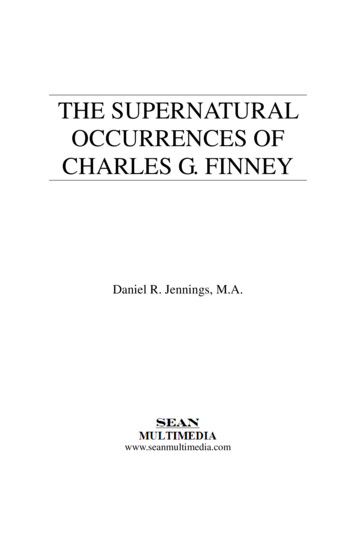
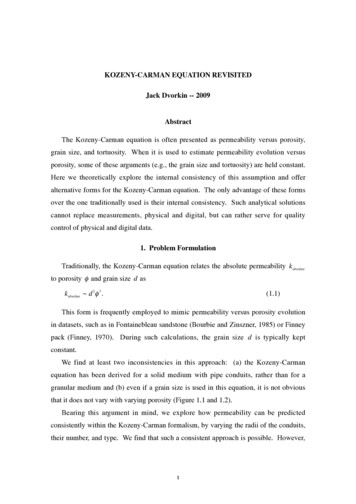
![The Book of the Damned, by Charles Fort, [1919], at sacred .](/img/24/book-of-the-damned.jpg)
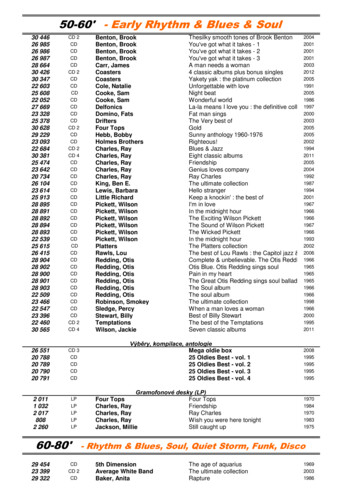
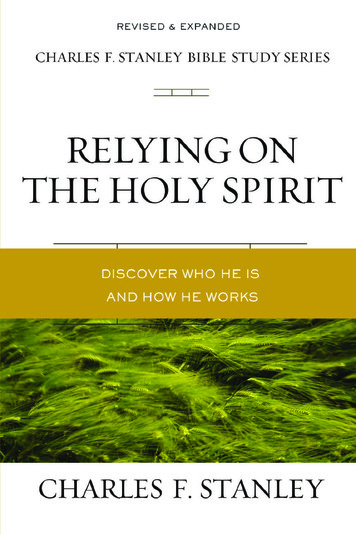

![Systematic Theology [1878] - hopefaithprayer](/img/20/systematic-theology-1878-finney.jpg)
